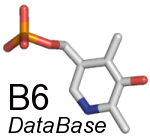|
|
| type |
Journal Article |
| authors |
Achmon Y, Ben-Barak Zelas Z, Fishman A. |
| title |
Cloning Rosa hybrid phenylacetaldehyde synthase for the production of 2-phenylethanol in a whole cell Escherichia coli system |
| journal |
Appl Microbiol Biotechnol |
| Activity |
4.1.1.109 |
| Family |
4.1.1.109.a |
| sel |
selected |
| ui |
24081322 |
| year |
(2014) |
| volume |
98 |
| number |
8 |
| pages |
3603-11 |
| | |
|---|
| keywords |
doi: 10.1007/s00253-013-5269-z |
| abstract |
2-Phenylethanol (2-PE) is a desirable compound in the food and perfumery industries with a characteristic rose fragrance. Until now, most of the studied biotechnological processes to produce 2-PE were conducted using natural 2-PE-producing yeasts. Only several researches were conducted in other genetically engineered microorganisms that simulated the Ehrlich pathway for the conversion of amino acids to fusel alcohols. Here, a novel metabolic pathway has been designed in Escherichia coli to produce 2-PE, using the Rosa hybrid phenylacetaldehyde synthase (PAAS), a pyridoxal 5'-phosphate (PLP)-dependent enzyme capable of transforming L-phenylalanine (L-phe) into phenylacetaldehyde by decarboxylation and oxidation. To overcome the enzyme insolubility in E. coli, several plasmids and host strains were tested for their expression ability. The desired results were obtained by using the pTYB21 plasmid containing the intein tag from the Saccharomyces cerevisiae VMA1. It was discovered that the intein PAAS activity is temperature-dependent, working well in the range of 25 to 30 °C but losing most of its activity at 37 °C. When external PLP cofactor was added, the cells produced 0.39 g l⁻¹ 2-PE directly from L-phe. In addition, a biotransformation that was based only on internal de novo PLP synthesis produced 0.34 g l⁻¹ 2-PE, thus creating for the first time an E. coli strain that can produce 2-PE from L-phe without the need for exterior cofactor additions. |
| last changed |
2018/05/03 11:15 |
|











